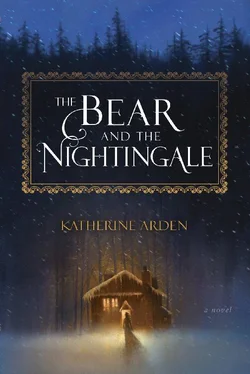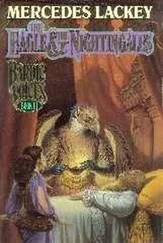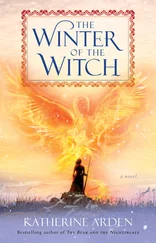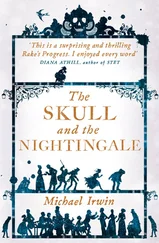He thought the shadows might have shifted just a little. But he heard only silence.

“HE WILL DO IT, I think,” Vasya said.
“Very likely,” said Morozko. He was laughing. “I have never done that at another’s behest.”
“And I suppose you frighten people all the time on your own account,” said Vasya.
“I?” said Morozko. “I am only a story, Vasya.”
And it was Vasya’s turn to laugh. Then her laugh caught in her throat. “Thank you,” she said.
Morozko inclined his head. And then the night seemed to reach out and catch him up, fold him inside itself, so that there was only the dark where he had been.

THE HOUSEHOLD HAD GONE to bed, and only Irina and Alyosha sat alone in the kitchen. Vasya glided in like a shadow. Irina had been crying; Alyosha held her. Wordless, Vasya sank onto the oven-bench beside them and wrapped her arms around them both.
They were all silent awhile.
“I cannot stay here,” said Vasya, very low.
Alyosha looked at her, dull with sorrow and battle-weariness. “Are you still thinking of the convent?” he said. “Well, you needn’t think of it again. Anna Ivanovna is dead, and so is Father. I will have my own land, my own inheritance. I will look after you.”
“You must establish yourself as a lord among men,” Vasya said. “Men will look less kindly upon you when it is known that you harbor your mad sister. You know that many will blame me for all this. I am the witch-woman. Has the priest not said so?”
“Never mind that,” said Alyosha. “There is nowhere for you to go.”
“Is there not?” said Vasya. A slow fire kindled in her face, easing the lines of grief. “Solovey will take me to the ends of the earth if I ask it. I am going into the world, Alyosha. I will be no one’s bride, neither of man nor of God. I am going to Kiev and Sarai and Tsargrad, and I will look upon the sun on the sea.”
Alyosha stared at his sister. “You are mad, Vasya.”
She laughed, but the tears blurred her sight. “Entirely,” she said. “But I will have my freedom, Alyosha. Do you doubt me? I brought snowdrops to my stepmother, when I ought to have died in the forest. Father is gone; there is no one to hinder. Tell me truly, what is there for me here but walls and cages? I will be free, and I will not count the cost.”
Irina clung to her sister. “Don’t go, Vasya, don’t go. I will be good, I promise.”
“Look at me, Irinka,” said Vasya. “You are good. You are the best little girl I know. Much better than I am. But, little sister, you don’t think I am a witch. Others do.”
“That is true,” said Alyosha. He had also seen the villagers’ black stares, heard their whispers during the funeral.
Vasya said nothing.
“Unnatural thing,” said her brother, but he was sad more than angry. “Can you not be content? Men will forget about all this in time, and what you call cages is the lot of women.”
“It is not mine,” said Vasya. “I love you, Lyoshka. I love you both. But I cannot.”
Irina began to cry and clung closer.
“Don’t cry, Irinka,” added Alyosha. He was looking at his sister narrowly. “She will come back. Won’t you, Vasya?”
She nodded once. “One day. I swear it.”
“You will not be cold and hungry on the road, Vasya?”
Vasya thought of the house in the woods, of the treasures heaped there, waiting. Not a dowry now, but gems to barter, a cloak against the frost, boots…all she needed for journeying. “No,” she said. “I do not think so.”
Alyosha nodded reluctantly. Implacable purpose shone like wildfire in his sister’s face.
“Do not forget us, Vasya. Here.” He reached up and drew off a wooden object, hanging on a leather thong about his neck. He handed it to her. It was a little carven bird, with worn outspread wings.
“Father made it for mother,” said Alyosha. “Wear it, little sister, and remember.”
Vasya kissed them both. Her hand closed tight around the wooden thing. “I swear it,” she said again.
“Go,” said Alyosha. “Before I tie you to the oven and make you stay.” But his eyes too were wet.
Vasya slipped outside. Just as she touched the threshold, there came her brother’s voice again, “Go with God, little sister.”
Even when the kitchen door swung shut behind her, it was not enough to muffle the sound of Irina’s weeping.

SOLOVEY WAS WAITING FOR her just outside the palisade. “Come,” Vasya said. “Will you bear me to the ends of the earth, if the road will take us so far?” She was crying as she spoke, but the horse nuzzled away her tears.
His nostrils flared to catch the evening wind. Anywhere, Vasya. The world is wide, and the road will take us anywhere.
She swung onto the stallion’s back and he was away, swift and silent as a night-flying bird.
Soon enough, Vasya saw a fir-grove, and firelight glancing between the trees, spilling gold into the snow.
The door opened. “Come in, Vasya,” Morozko said. “It is cold.”
Students and speakers of Russian will surely note, and possibly deplore, my wildly unsystematic approach to transliteration.
I can almost hear the hand-wringing of readers, who will be asking, for example, by what possible method could I have gotten vodianoy from the Russian водяной and then have turned around and gotten domovoi from the Russian домовой, a word with an identical ending?
The answer is that in transliterating, I had two aims.
First, I sought to render Russian words in such a way as to retain a bit of their exotic flavor. This is the reason I rendered Константин as Konstantin rather than the more familiar Constantine, and Дмитрий as Dmitrii rather than Dmitri.
Second, and more important, I wanted these Russian words to be reasonably pronounceable and aesthetically pleasing to speakers of English.
I like the way vodianoy looks on the page, just as I like the look of the name Aleksei (Алексей) but preferred to render the name Соловей as Solovey.
I dropped any attempt to indicate hard and soft signs, with apostrophes or otherwise, as these have absolutely no meaning for the average English-speaking reader. The only exception is in the word Rus’, where the extensive use of that spelling with the apostrophe in historiography has made it the most familiar of any to English-speaking readers.
To students of Russian history, I can say only that I have tried to be as faithful as possible to a poorly documented time period. When I have taken liberties with the historical record—for example, in making Prince Vladimir Andreevich older than Dmitrii Ivanovich (he was actually a few years younger) and marrying him to a girl named Olga Petrovna—it was for dramatic purposes, and I hope my readers will indulge me.
BABA YAGA—An old witch who appears in many Russian fairy tales. She rides around on a mortar, steering with a pestle and sweeping her tracks away with a broom of birch. She lives in a hut that spins round and round on chicken legs.
BANNIK—“Bathhouse dweller,” the bathhouse guardian in Russian folklore.
BAST SHOES—Light shoes made of bast, the inner bark of a birch tree. They were easy to make, but not durable. Called lapti.
Читать дальше














